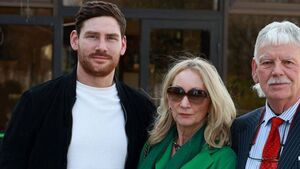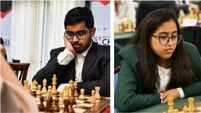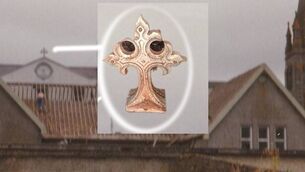Heartbroken parents seek answers after son's death at Portlaoise hospital

The late David Duncan's brother Mark, mother Ann and father Tony pictured leaving the Laois Coroner's Court on 20 March, after the resumed inquest into his death at the psychiatric department of the Midlands Regional Hospital Portlaoise. Photo: Colin Keegan, Collins
EVIDENCE of hospital staff who treated a mentally ill patient at the Midlands Regional Hospital in Portlaoise, who took his own life while he was meant to be under “continuous observation”, was halted at an inquest last week, following an application by lawyers for the HSE.
Details of the application cannot be published after counsel for the HSE, Conor Halpin SC, successfully applied to Laois county coroner Eugene O’Connor for reporting restrictions to be imposed on the nature of the request to postpone hearing evidence from medical witnesses.
David Duncan (42), a single man from Rathevan, Portlaoise, Co Laois died on 21 January 2024 – three days after he had been detained under the as an involuntary patient at the hospital.
He was discovered in an unresponsive state on his bed in a seclusion room with padded walls and floors in the psychiatric ward of the Midlands Regional Hospital in Portlaoise.
The coroner heard evidence that Mr Duncan had struggled for most of his life with schizophrenia and had numerous admissions as both a voluntary and involuntary patient over the years.
At a resumed hearing of an inquest into his death at Laois Coroners Court on 20 March, Mr O’Connor said he would proceed with hearing evidence from other witnesses after granting the application to adjourn evidence in relation to hospital staff.
Marina Bowe, a consultant psychiatrist who treated the deceased at Highfield Healthcare – a rehabilitation centre for mentally ill people in Whitehall, Dublin – gave evidence that she had signed a letter to arrange Mr Duncan’s transfer to the hospital in Portlaoise on 18 January 2024.
Dr Bowe said Mr Duncan had been detained under the Mental Health Act for involuntary admission to the hospital as he had been assessed as being in need of acute, in-patient psychiatric care.
The psychiatrist said it had been hoped that the deceased would access services that would stabilise his mental health, which would allow him to access treatment in the community.
Dr Bowe said she had assessed the deceased as having an elevated mood who had expressed suicidal ideation but who denied having a plan to take his own life.
She told the coroner that Mr Duncan’s mental health had deteriorated over the previous month after his delusional beliefs appeared to increase around Christmas, at a time when he had disengaged from his family.
The inquest heard he had obtained cocaine after leaving Highfield without permission on 12 January 2024, which also seemed to increase his delusional behaviour.
Mr Duncan also absconded from the rehab centre on 17 January 2024 and was discovered by gardaí on train tracks at Heuston Station in Dublin before being detained under the for his own safety.
The inquest also heard that Mr Duncan had escaped from the Midlands Regional Hospital on the day of his admission and was found later in Edenderry by gardaí, who returned him to Portlaoise.
Dr Bowe said it was unclear what had precipitated changes in Mr Duncan over the last month of his life and she noted he had been “doing well”.
Although he had responded well to some medication, she believed he had not always taken the prescribed doses and had also engaged in substance misuse.
The psychiatrist said she had assessed him as being at a high risk of going ‘AWOL’ and of self-harm as well as violence.
Questioned by counsel for Mr Duncan’s family, Will Fennelly BL, about what expectations she had about the deceased’s admission to the hospital in Portlaoise, Dr Bowe replied that she could not be an expert witness in a case in which she was directly involved.
However, she acknowledged that she had never personally experienced that a patient’s risk level could change in seconds.
Mr Halpin observed that the witness was being asked “to critique the HSE”.
However, Dr Bowe agreed with Mr Fennelly that Mr Duncan was “in a serious state” on his admission to hospital in Portlaoise.
State pathologist Heidi Okkers, who conducted a postmortem on the deceased’s body, gave evidence that she would not expect that there would be stiffness in the limbs of someone who had died within 15 minutes.
Dr Okkers made the comment after Mr Fennelly had noted that hospital records had recorded stiffness in the patient’s neck and limbs shortly after his death.
The pathologist said she understood from medical records that Mr Duncan had been checked every 15 minutes.
The inquest also heard evidence from Garda John Foley about being alerted to the death of a patient in the hospital’s psychiatric ward on 21 January 2024.
Garda Foley said there were two cameras in the seclusion room where Mr Duncan was found, but they only provided a live feed and were not recording as per protocol.
The inquest heard a staff nurse had discovered the patient prone on his mattress with a pillow over his face and a blanket over his body at 10.30am.
CPR was applied to Mr Duncan for around 30 minutes without success and he was formally pronounced dead at 11.05am.
Garda Damien Dempsey said he had been informed by another staff nurse that she had observed the patient on camera at 10.15am, when she said there was “nothing out of the ordinary”.
The inquest heard the nurse told gardaí that she presumed Mr Duncan was sleeping from his position on the mattress.
The coroner adjourned proceedings until 9 May for an update on evidence to be provided by HSE witnesses.
A separate review of Mr Duncan’s death is being carried out by the HSE.
At an earlier sitting of the inquest last month, the deceased’s father Tony Duncan claimed the circumstances of his son’s death would demonstrate gross negligence, incompetence and catastrophic failure by the hospital’s Department of Psychiatry.
Mr Duncan stated: “We as a family took great solace that when David was in the Department of Psychiatry, he was safe. Sadly, this trust has been totally shattered and David has paid the ultimate price.”
He added: “David should not be dead, but he is, and this inquest will not change that devastating fact, but it is our hope that something good might come out of it in terms of fundamental changes and accountability that just might, if implemented, save the life of other very ill and vulnerable service users.”




